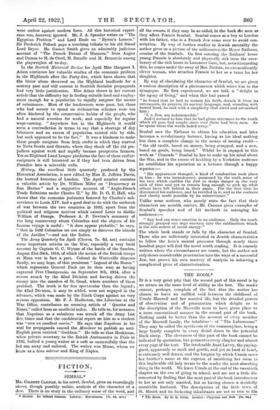FICTION.
SEMBAL.*
Ma. GILBERT Caaraasar, in his novel, Setnbal, gives an exoeedingly clever, though possibly unfair, analysis of the character of a Jew. There is no story in the ordinary sense of the word, and
• 'Ranted. By Gilbert Cannan. London Hutchinson. 17s.Cel. net.]
all the events, if they may be so called, in the book eke seen as they affect Francis SembaL Sembal comes as a boy to London with his father, who is a French Jew come over to avoid con- scription. By way of further studies in Jewish mentality the author gives us a picture of the millionaires, the Meyer Nathane, cousins of the Sembals. On first entering the Nathans' home young Francis is absolutely and physically sick from the over- luxury of the rich house in Lancaster Gate, but, notwithstanding this, he comes under the sway of Mrs. Nathan, an extraordinarily clever woman, who attaches Francis to her as a tutor for het daughter.
By way of elucidating the character of Sembal, we are given a curious description of a phenomenon which seizes him in the synagogue. He first experienced, we are told, a " delight in the agony of living," and when this had passed
" he found that he had to restate his faith, detach it from its ceremonies, its prayers, its ancient language, and, standing with bowed head, he said with a simplicity that awed and astonished him :
' I, a Jew, am indestructible.'
And it seemed to him that he had given utterance to the truth which all men had sought since ever there had been men. As he spoke them the words faded away."
Sembal uses the Nathans to obtain his education and later becomes a revolutionary lecturer, having as his ideal nothing less than a complete change in the means of issuing credit- " the old credit, based on money, being scrapped, and a new, based on goods, being issued." Whilst he is engaged in this work as " Comrade " Sembal he has to make up his mind about the War, and in the course of heckling by a Yorkshire audience he establishes his reputation as a lecturer through a happy repartee :— " His appearance changed, a kind of combustion took place in him : he was incandescent, possessed by the sixth sense of his race which enables the Jew to dodge danger in the very nick of time and yet to remain long enough to pick up what others have left behind in their panic. For the first time he dominated his audience, and he revelled in it, and in the coolness and clarity made possible by its subservience."
Unlike some authors, who merely state the fact that their characters are notable orators, Mr. Cannan gives examples of Sembal's speeches and of his methods in managing his audiences :- " Any fool can rouse emotion in an audience. Only the truth strongly grasped can urge -emotion into the sublimation which is the sole source of social energy."
The whole book stands or falls by the character of Sembal. Those who are sufficiently interested in Jewish characteristics to follow the hero's mental processes through nearly three hundred pages will find the novel worth reading. It is coarsely written where the circumstances are coarse, but the author not only shows considerable penetration into the ways of a successful Jew, but proves his own mastery of analysis in achieving a complicated piece of characterization.


































 Previous page
Previous page